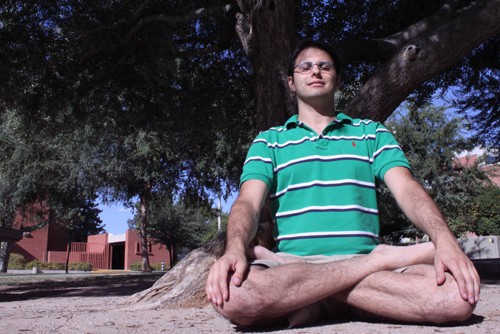There is more to meditation than sitting in the lotus position.
The Arizona Meditation Research Interest Group on campus not only agrees, but organizers say they can provide several studies and statistics showing meditation’s positive effects on the body.
Tucker Peck, a psychology doctoral student, founded this club in November 2008 and now serves as its president.
The club began as a group of graduate students researching the biological and psychological effects of meditation, but later expanded to include a diverse group of people, he said.
There are a total of 40 undergraduate and graduate students from seven departments across campus who are part of the club. Last year the Associated Students of the University of Arizona funded two different conferences for the group and Peck was sent to see the Dalai Lama in Boston, a trip costing $6,000-$8,000.
The group is currently working on a spreadsheet mapping every meditation study ever done in the nation. They have about 93 so far, Peck said, but the list is “”never-ending.””
Meditation has been found to improve depression, decrease anxiety, increase coping skills and help with physical problems such as chronic pain, insomnia and psoriasis, he said.
“”By living in a state of constant stress your immune system gets depressed by chemicals that the stress gives off, and meditation works with your immune system,”” he said.
Alfred W. Kaszniak, head of the department of psychology, said, “”I have been encouraging of the group’s formation and activity, and am engaged in research on meditation within my own laboratory.””
He added that interest in meditation has been increasing in recent years among scientists as well as the general public.
“”Meditation is about dealing with one problem that you have and acknowledging it, instead of creating 10 other problems to solve the first one,”” Peck said.









